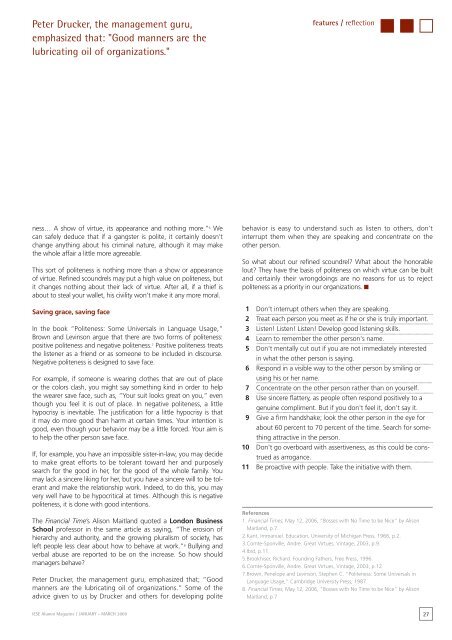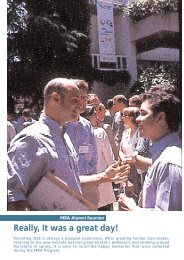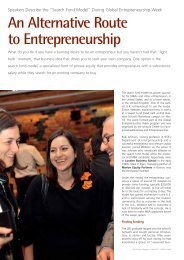Alumni Magazine - revista iese.
Alumni Magazine - revista iese.
Alumni Magazine - revista iese.
Create successful ePaper yourself
Turn your PDF publications into a flip-book with our unique Google optimized e-Paper software.
Peter Drucker, the management guru,<br />
emphasized that: "Good manners are the<br />
lubricating oil of organizations."<br />
features / reflection<br />
ness… A show of virtue, its appearance and nothing more.” 6 We<br />
can safely deduce that if a gangster is polite, it certainly doesn’t<br />
change anything about his criminal nature, although it may make<br />
the whole affair a little more agreeable.<br />
This sort of politeness is nothing more than a show or appearance<br />
of virtue. Refined scoundrels may put a high value on politeness, but<br />
it changes nothing about their lack of virtue. After all, if a thief is<br />
about to steal your wallet, his civility won’t make it any more moral.<br />
Saving grace, saving face<br />
In the book “Politeness: Some Universals in Language Usage,“<br />
Brown and Levinson argue that there are two forms of politeness:<br />
positive politeness and negative politeness. 7 Positive politeness treats<br />
the listener as a friend or as someone to be included in discourse.<br />
Negative politeness is designed to save face.<br />
For example, if someone is wearing clothes that are out of place<br />
or the colors clash, you might say something kind in order to help<br />
the wearer save face, such as, “Your suit looks great on you,” even<br />
though you feel it is out of place. In negative politeness, a little<br />
hypocrisy is inevitable. The justification for a little hypocrisy is that<br />
it may do more good than harm at certain times. Your intention is<br />
good, even though your behavior may be a little forced. Your aim is<br />
to help the other person save face.<br />
If, for example, you have an impossible sister-in-law, you may decide<br />
to make great efforts to be tolerant toward her and purposely<br />
search for the good in her, for the good of the whole family. You<br />
may lack a sincere liking for her, but you have a sincere will to be tolerant<br />
and make the relationship work. Indeed, to do this, you may<br />
very well have to be hypocritical at times. Although this is negative<br />
politeness, it is done with good intentions.<br />
The Financial Time’s Alison Maitland quoted a London Business<br />
School professor in the same article as saying, “The erosion of<br />
hierarchy and authority, and the growing pluralism of society, has<br />
left people less clear about how to behave at work.” 8 Bullying and<br />
verbal abuse are reported to be on the increase. So how should<br />
managers behave?<br />
Peter Drucker, the management guru, emphasized that; “Good<br />
manners are the lubricating oil of organizations.” Some of the<br />
advice given to us by Drucker and others for developing polite<br />
behavior is easy to understand such as listen to others, don’t<br />
interrupt them when they are speaking and concentrate on the<br />
other person.<br />
So what about our refined scoundrel? What about the honorable<br />
lout? They have the basis of politeness on which virtue can be built<br />
and certainly their wrongdoings are no reasons for us to reject<br />
politeness as a priority in our organizations.<br />
1<br />
2<br />
3<br />
4<br />
5<br />
6<br />
7<br />
8<br />
9<br />
10<br />
11<br />
Don't interrupt others when they are speaking.<br />
Treat each person you meet as if he or she is truly important.<br />
Listen! Listen! Listen! Develop good listening skills.<br />
Learn to remember the other person's name.<br />
Don't mentally cut out if you are not immediately interested<br />
in what the other person is saying.<br />
Respond in a visible way to the other person by smiling or<br />
using his or her name.<br />
Concentrate on the other person rather than on yourself.<br />
Use sincere flattery, as people often respond positively to a<br />
genuine compliment. But if you don't feel it, don't say it.<br />
Give a firm handshake; look the other person in the eye for<br />
about 60 percent to 70 percent of the time. Search for something<br />
attractive in the person.<br />
Don't go overboard with assertiveness, as this could be construed<br />
as arrogance.<br />
Be proactive with people. Take the initiative with them.<br />
References<br />
1. Financial Times, May 12, 2006, “Bosses with No Time to be Nice” by Alison<br />
Maitland, p.7.<br />
2. Kant, Immanuel. Education, University of Michigan Press, 1966, p.2.<br />
3. Comte-Sponville, Andre. Great Virtues, Vintage, 2003, p.9.<br />
4. Ibid, p.11.<br />
5. Brookhiser, Richard. Founding Fathers, Free Press, 1996.<br />
6. Comte-Sponville, Andre. Great Virtues, Vintage, 2003, p.12.<br />
7. Brown, Penelope and Levinson, Stephen C. “Politeness: Some Universals in<br />
Language Usage,” Cambridge University Press, 1987.<br />
8. Financial Times, May 12, 2006, "Bosses with No Time to be Nice" by Alison<br />
Maitland, p.7<br />
IESE <strong>Alumni</strong> <strong>Magazine</strong> / JANUARY - MARCH 2009 27
















